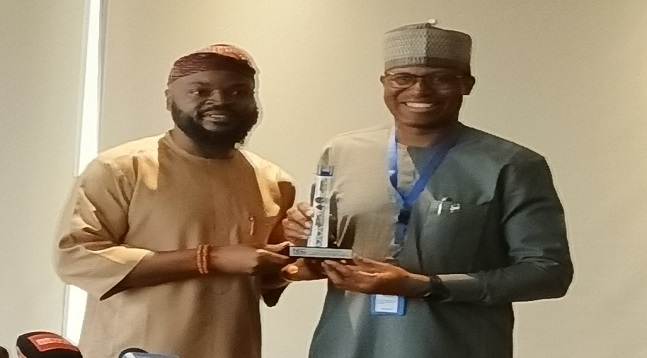Telecom
Ransomware Persisted Despite Improved Detection in 2022 – IBM Report

IBM Security released its annualX-Force Threat Intelligence Index finding that although ransomware’s share of incidents in the Middle East and Africa (MEA) held steady at 18%, globally defenders were more successful detecting and preventing ransomware.

Despite this, attackers continued to innovate, with the report showing that globally the average time to complete a ransomware attack dropped from two months down to less than 4 days.
According to the 2023 report, the deployment of backdoors, which allow remote access to systems, emerged as the top action by attackers in the MEA region last year. Backdoor deployments were detected in 27% of the cases X-Force responded to in this region in 2022. Ransomware and worms tied for the second-most common attack type in the region at 18% each. The uptick in backdoor deployments can be partially attributed to their high market value. X-Force observed threat actors selling existing backdoor access for as much as $10,000, compare this to stolen credit card data, which sells for less than $10 per card today.
As organizations across the MEA region try to address the ever-evolving cyber threats landscape, Frida Kleimert Knibbs, Security Leader at IBM MEA, stressed the critical role of threat intelligence in safeguarding against these threats. She commented: “Proactively managing security risks and evolving cybercrime tactics is a critical priority for organizations across MEA. The X-Force Threat Intelligence Index findings demonstrate the continued threat of ransomware and the increasing use of thread hijacking tactics.”
She added: “To safeguard against these threats, it’s imperative that companies remain vigilant and focus on effective incident response planning. As the security landscape evolves, it is crucial to prioritize threat intelligence and strengthen defenses”.
The IBM Security X-Force Threat Intelligence Index tracks new and existing trends and attack patterns – pulling from billions of datapoints from network and endpoint devices, incident response engagements and other sources.
Some of the key findings in the 2023 report include:
- Extortion: Threat Actors Go-to Method. The most common impact from cyberattacks in 2022 was extortion, which was primarily achieved through ransomware or business email compromise attacks. Extortion and financial loss each accounted for half of identified impacts in incidents across the MEA region in 2021. Manufacturing was the most extorted industry globally in 2022, and it was again the most attacked industry for the second consecutive year. Manufacturing organizations are an attractive target for extortion, given the extremely low tolerance for down time.
- Cybercriminals Weaponize Email Conversations. Thread hijacking saw a significant rise in 2022, with attackers using compromised email accounts to reply within ongoing conversations posing as the original participant. X-Force observed the rate of monthly attempts increase by 100% globally compared to 2021 data. Over the year, X-Force found that attackers used this tactic to deliver Emotet, Qakbot, and IcedID, malicious software that often results in ransomware infections.
- Legacy Exploits Still Doing the Job. The proportion of known exploits relative to vulnerabilities declined 10 percentage points globally from 2018 to 2022, due to the fact that the number of vulnerabilities hit another all-time high. The findings indicate that legacy exploits enabled older malware infections such as WannaCry and Conficker to continue to exist and spread.
- Phishers “Give Up” on Credit Card Data. The number of cybercriminals targeting credit card information in phishing kits dropped 52% globally in one year, indicating that attackers are prioritizing personally identifiable information such as names, emails, and home addresses, which can be sold for a higher price on the dark web or used to conduct further operations.
- Finance and Insurance Remain Prime Targets for Cyberattacks in MEA: In the Middle East and Africa, Finance and insurance was the most-targeted industry in 2022, accounting for 44% of incidents and down slightly from 2021 at 48%. Professional, business and consumer services accounted for 22% of attacks, with manufacturing and energy tying for third place at 11%.
The report features data IBM collected globally in 2022 to deliver insightful information about the global threat landscape and inform the security community about the threats most relevant to their organizations. You can download a copy of the 2023 IBM Security X-Force Threat Intelligence Report here.
Additional sources
- Read more about the report’s top findings in this IBM Security Intelligence blog.
- Sign up for the 2023 IBM Security X-Force Threat Intelligence Index webinar on Thursday, March 2, 2022, at 11:00 a.m. ET here
- Schedule a consult with IBM Security X-Force
Telecom
Banks, Telcos Settle Four-Year Dispute over N300Bn USSD Debt

Banks and telecommunications operators in Nigeria have ended a four-year dispute over nearly N300bn owed for Unstructured Supplementary Service Data services (USSD), with the debt now fully cleared, according to Association of Licensed Telecommunications Operators of Nigeria (ALTON).

Gbenga Adebayo, chairman, announced the resolution on Thursday during an official visit to Idris Olorunnimbe, chairman, Nigerian Communications Commission (NCC).
He credited the intervention of the NCC, led by Dr Aminu Maida, executive vice chairman of the commission, with bringing the long-standing dispute to a close.
“When Dr Maida assumed office, he inherited significant industry challenges,” Adebayo said.
“One of the most difficult was the USSD debt crisis, a debt burden that grew over four years to nearly N300bn. It had become a systemic risk to our sector and the digital financial ecosystem.
Through firm leadership, structured engagement, and decisive coordination, Dr Maida and his team resolved this issue.
Today, there is no outstanding USSD debt. The ecosystem has fully migrated to end-user billing. What was once a looming crisis has been converted into a sustainable framework.”
The clearing of the debt ends years of accusations and counter-accusations between banks and telecom operators, which had threatened the stability of digital financial services in the country.
Adebayo praised the NCC’s leadership for steering the telecom sector through one of its most delicate periods, noting other interventions, including last year’s approval of a 50 per cent USSD tariff.
He described the resolution of the debt crisis as a milestone for the telecom and digital finance ecosystem, ensuring sustainability and predictability for operators and service providers.
Nigeria’s telco and bank billing for USSD services transitioned to the end-user billing model in mid-2025, moving charges from bank accounts to customers’ mobile airtime, which is deducted directly by telecom operators.
This shift resolved the long-standing dispute in which banks owed operators up to N300bn in unpaid USSD fees.
The transition arose from years of tension between telecom operators, including MTN and Airtel, and banks over USSD revenue sharing, with debts peaking at N250–300bn by 2024.
The NCC, in collaboration with the Central Bank of Nigeria, developed the EUB framework to standardise billing, enhance transparency, and support financial inclusion for unbanked users who rely heavily on USSD codes.
Under the EUB system, charges are now deducted directly from mobile airtime at N6.98 per session lasting up to 120 seconds, with user consent prompts issued before each deduction. Banks no longer bill for USSD services; telcos handle them exclusively, with regulatory safeguards preventing double-billing. Users can opt in or out of the service, and banks are required to notify customers in advance of any USSD session charges.
Migration to the EUB model began between June 3 and 18, 2025, following partial debt repayments amounting to N171bn. By February 19, 2026, banks had fully cleared the remaining debt, solidifying the EUB rollout.
The model improves user control through immediate airtime deductions and session notifications, similar to voice and SMS billing. While some critics have expressed concern over potential burdens on low-income users, the transition strengthens telecom revenue sustainability and contributes to the stability of Nigeria’s digital financial ecosystem.
Credit: Punch
Telecom
MTN, FAAN Unveil Free WiFi @ Lagos, Abuja Airports

Federal Airports Authority of Nigeria (FAAN) and MTN Nigeria have launched free, high-speed WiFi services for passengers at the international wing of the Murtala Muhammed Airport in Lagos and the Nnamdi Azikiwe International Airport in Abuja.

The partnership, both bodies explained, will be followed up with similar development taking place at the airports in Kano, Port Harcourt and Enugu within the next few months.
Mrs Olubunmi Kuku, managing director of FAAN, officially unveiled the internet service at MMIA Terminal two.
Kuku, who was represented by Capt. Abdullahi Mahmood, director of Airport Operations, described the initiative as a major milestone partnership for the aviation ecosystem.
The FAAN boss said the milestone marked a new benchmark in digital infrastructure and passenger experience across Nigerian airports.
According to her, the free WiFi service will be extended to the MMIA Temporary Terminal within weeks, before extension to Enugu, Port Harcourt, and Kano international airports over the next three months.
“In 21st century Nigeria, no Nigerian airport should be an offline island.
“This collaboration with MTN Nigeria demonstrates how effective Public-Private Partnership (PPP) alignment can modernise infrastructure and strengthen the country’s digital economy,” she said.
Kuku assured travellers that FAAN was committed to closing service gaps and enhancing operational efficiency across airports nationwide.
“This WiFi is our promise that FAAN is listening. We have turned on the signal today, but the signal we are truly sending is this: Nigerian aviation is writing a new chapter; one of innovation, partnership, and unwavering commitment to excellence,” she said.
Kuku said the project was a key component of the digital economy agenda led by President Bola Tinubu and the transformative vision of Mr Festus Keyamo, minister of Aviation.
She commended MTN Nigeria for its technical expertise and investment in the project, describing the partnership as purpose-driven and transformative.
On his part, Mr Karl Toriola, chief executive officer of MTN Nigeria, who was represented by Lynda Saint-Nwafor, chief enterprise business officer, assured passengers that the service would be reliable, secure and efficient.
“We are proud to announce the launch of a free WiFi service across major airports in Nigeria in partnership with FAAN.
“This initiative reflects a shared commitment to improving passenger experience and enhancing digital accessibility,” Toriola said.
He noted that airports served as critical gateways for business travellers, tourists, airport personnel and service providers, all of whom required seamless connectivity.
“With this service, travellers waiting to board, in transit, or upon arrival can now stay connected freely and effortlessly,” he added.
MTN Nigeria also announced plans to activate on-ground engagement campaigns at the Lagos and Abuja airports over the next month to drive awareness and encourage usage.
According to the telecom giant, the project reinforces its commitment to national infrastructure development and expanding digital access in public spaces.
Telecom
NCC Mulls Sanction on Road Contractors Destroying Metro Fibre of Telcos

Nigerian Communications Commission (NCC) is considering imposing sanction on any road contractor that destroys telecommunications metro fibre across the country.

Idris Olorunnimbe, chairman, Board of Commissioners, NCC, stated this at congratulatory visit to the Chairman by members of Association of Licensed Telecommunications Operators of Nigeria (ALTON) in Lagos yesterday.
According to him, “I think what we need to do to address the damage of metro fibre by government contractors is simply. He who cuts It must fix it, and we’ll take this message to our state governments.
If any contractor knows that if they damage that critical national infrastructure, their work is going to stop and they are going to be the ones to fix it, they will not destroy it.
Responding, Engr. Gbenga Adebayo, chairman, Association of Licensed Telecommunications Operators of Nigeria (ALTON), said up until now, there are no consequences for those infractions, and if there are no consequences, the tendency to continue to do bad is very high.
“Contractors of government carrying out roadworks, whether road maintenance or road expansion, and their machines destroy communications super highway at will, if there are consequences, or if there were consequences some of those actions will not have escalated to the level that we are in.
“What the chairman has said today is very important, if you destroy it you fix it. What we are expecting now is that the consequence of managing those problems will be a lot more, and there will be legal deterrent for people from destroying operators’ fibre. I must emphasize the communication super highway. That’s the highway by which all the signals are carried.
“When this highway is broken, it’s like you have a major bridge that’s broken. You can’t reach east, neither can you reach west. And until we take it as the major super communications highway and so protective, we will continue to be where we are.
“That’s actually what it is. When this highway is broken, we are all affected. So, it’s no longer an infrastructure that is for operators, but it belongs to all of us. If I don’t have service on my phone, some of these are the consequence of this violation that we are seeing.
Earlier in his welcome address, Engr. Adebayo highlighted some of the key challenges in the sector which includes: Daily fibre cuts — often caused by federal and state road construction contractors — are creating enormous economic losses.
- Nationwide service disruptions
- Destruction of critical digital infrastructure
- Loss of assets without compensation
- Banking, education, and security interruptions
There is currently insufficient institutional recourse for operators when these damages occur. A structured pre-construction fibre mapping and mandatory coordination framework is urgently required.
Key Regulatory Priorities for Sector Stability
- Independence of the Regulator
He said regulatory independence ensures:
- Credible oversight
- Investor confidence
- Transparent decision-making
- Long-term sector stability
Independence must not only exist in law — it must be visible in practice.
“We recommend: Legislative reinforcement explicitly affirming NCC independence
- Clear codification of interaction boundaries between the regulator and supervising authorities
- Operational safeguards insulating regulatory processes from undue influence
Multiple Regulation
Overlapping regulatory interventions by various MDAs on matters already within NCC jurisdiction create:
- Duplicative investigations
- Conflicting directives
- Increased compliance costs
- Regulatory uncertainty
“We recommend structured inter-agency coordination frameworks and legislative clarification reaffirming NCC’s exclusive jurisdiction over telecommunications matters.
Multiple Taxation
Adebayo stated that operators continue to face excessive sub-national taxes and levies.
Enforcement tactics such as site shutdowns directly affect Quality of Service and national connectivity.
A harmonized national telecom taxation framework is essential for broadband expansion and digital inclusion.

 Telecom3 days ago
Telecom3 days agoTerra Moves to Expand in African Drone Sector, Secures $22m Funding

 Telecom3 days ago
Telecom3 days agoTemu Assures Compliance Amid Nigeria Data Privacy Probe

 E-Financial3 days ago
E-Financial3 days agoDMO Offers ₦800bn FGN Bonds in February Auction Surge

 E-Financial3 days ago
E-Financial3 days agoDanjuma, Taj Bank Staff Jailed for 5 Years over N22m Fraud

 E-Financial3 days ago
E-Financial3 days agoKPMG Outlook Reveals Financial Services CEOs Double down on AI, Resilience and Growth in 2026

 E-Financial2 days ago
E-Financial2 days agoEcobank Nigeria Fully Repays $300m Eurobond Notes

 News3 days ago
News3 days agoChianugo, Nigerian $150m suit Against Google, GoDaddy.com Stalled due Judge’s Absence

 E-Financial2 days ago
E-Financial2 days agoZenith Bank Warns Public Over Fake Jim Ovia Investment Videos


























